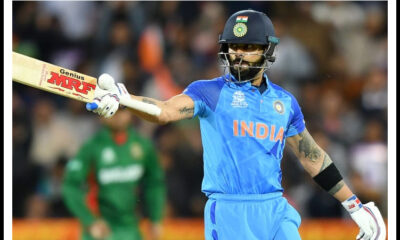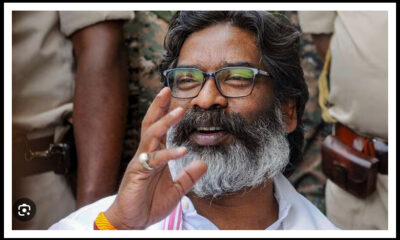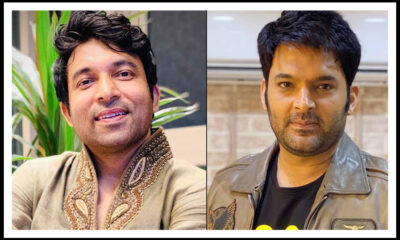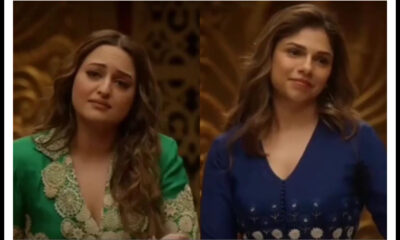Bollywood
Review of Anubhuti: An Entertaining, Though Occasionally Difficult, Oddity
Published
3 months agoon

On Tuesday, Anubhuti had its debut at the Rotterdam 2024 International Film Festival
Several Indian filmmakers have adapted the life of the mystic-poet Meerabai from Rajasthan to the big screen since the silent era, including Debaki Bose (1933), Ellis R. Dungan (1947), and Gulzar (1979). They portrayed Durga Khote, M.S. Subbulakshmi, and Hema Malini, respectively, as historical or literary figures whose writings and folklore had endured for over four centuries in India.
Anubhuti, the second feature-length film by Kolkata-based director Anirban Dutta, debuted on Tuesday at the 2024 International Film Festival Rotterdam. It places Meerabai in a romantic triangle with the revered Lord Krishna and his legendary cowherdess-lover Radha. A unique method is used in the movie to map a poet’s soul in an unearthly realm.
The Hindi-language movie differs greatly from all the earlier dramatic renditions of the Meerabai tale. It sees her only through the lens of her devotion-drenched poetry, works that are still sung and repeated today and are an essential component of the literature of the Bhakti movement in medieval Hinduism.
The film captures Meera’s expressions of her sublime love for Lord Krishna through visual means. Anubhuti is a captivating, if occasionally difficult, anomaly distinguished by melodic variety and graceful performance.
It is an extremely stylized, abstract performance piece that may be confusing to viewers of traditional movies. Rather than weakening the movie’s capacity to convey its meaning to an astute and patient audience, the deliberate non-linear opacity strengthens the concept.
Many of Meera’s most well-known bhajans are collected by Anubhuti, who then interprets them in a variety of Hindustani classical ragas that capture the varied moods of the Mewar princess-turned-saint. The poems and songs convey a wide range of emotions and moods, including desire and anticipation, hope and disappointment, pleasure and envy, faith and despair.
The video employs several artistic mediums such as music, dance, song, and a repertoire of mudras and controlled acting to arouse the attentive viewers into a state of consciousness that gradually becomes more responsive as the exercise progresses at a slow and gentle pace.
Anubhuti is a collection of theatrical vignettes that provide a window into Meera’s unfathomable devotion to Lord Krishna and her conviction that she is Radha personified in both a parallel universe and an earlier time period. In a dreamscape full of colors symbolic of longing, Radha and Meera become friends, uniting earthly passion and ethereal affection.
A range of emotions, both permeable and impermeable, are articulated by bodies, hands, fingers, and delicately dancing feet as the legendary and the historical blend together. Radha is a mythological figure who is exalted yet grounded, while Meerabai is a historical mortal lady who left up her royal luxuries and familial bonds to pursue her dream of divinity.
Read also:-Meta Releases Llama 70B, the AI Coding Model, Described as “Largest” and “Best-Performing” in the Llama Family
The two women from different time zones and states of consciousness are connected by what they both adore and long for: an unprompted response from Krishna. Krishna, for his part, quietly exits the sphere of holiness and expresses feelings that seem entirely human.
Meera searches Radha for her reflection. Envy and sometimes irritation over Lord Krishna’s erratic attention upset Radha. Sensual and material elements often blend in ways that are difficult to fully understand. They are independent of spoken articulation. The picture offers a wider variety of cinematic experiences because of its persistent unfathomability.
Drawing inspiration from Jayadeva’s Gita Govinda, which portrays Krishna and Radha’s love, Anubhuti occasionally refers to Kangra and Pahadi miniatures to shed light on the relationship between Radha and Meera in regard to their intense devotion. Seen in the context of how unwavering devotion unfolds and unites with the kind of indescribable and elevating emotion that frequently stays unfulfilled because the heavenly ways do not yield to the demands of the temporal, it is understood.
Love and ardor are clearly defined by Dutta’s dialogue-free tale, which cuts beyond time, haptic dimensions, and the line separating humans and divinities. He treats his actors, Shamila Bhattacharya (Radha), Rittick Bhattacharya (Krishna), and Aritraa Sengupta (Meera), like putty. They completely yield to the director’s direction as both emotional cue-givers and containers of difficult ideas.
In his debut feature Jahnabi (2018), Dutta demonstrated his unwavering filmmaking approach in a comprehensive manner. The most of the communication in the movie, which is about a lady who longs to talk to her lover, was nonverbal. It made a comparison between women and rivers, pointing out how both are essential to human civilization and are subjected to deprivation, exploitation, and love.
Like Jahnabi, Anubhuti is based on techniques that originate from the palette of a visual artist who seeks the sublime by looking past the ordinary. The movie also has the essence of a photographer who thoughtfully considers the significance of each frame.
The costumes and visual direction for this ultra-independent film were created by Dutta, who also produced it on her own. He fills the frames with physical movement, hand and eye expressions, carefully chosen backdrops, voices that recite (Srijan Chatterjee) and sing (Pandit Ajoy Chakraborty and Vaishali Sinha, the film’s music composer), and instrumental pieces that heighten the enigmatic quality of passion rooted in spirituality. He uses the movie camera (managed by Soham Dey) and audio recording devices.
A few words are not pronounced exactly among the wide variety of sounds in the movie. The unusual gaps stand out because they break the overall sound balance that the picture maintains for the better part of its ninety minutes. However, they are not so numerous or obvious as to permanently damage the movie.
Anubhuti is a labor of love that deserves praise for her unwavering dedication to an unadulterated approach to image-making. It’s the kind of film that can only be made when a director can free himself from the allure of widespread acclaim.
Cast:
Rittick Bhattacharya, Shamila Bhattacharya, and Aritraa Sengupta
Director:
Anirban Dutta
Credent TV Editorial Team

You may like
-


Kohli brings out alternative arsenal to counter spin bowling ahead
-


The Supreme Court rules that former Jharkhand Chief Minister Hemant Soren’s plea in a money laundering case was “infructuous.”
-


The Great Indian Kapil Show: “Don’t Get Entertainment, What’s The Point?” is how former teammate Chandan Prabhakar of Kapil Sharma responds to Netflix ending the season
-


“I wish she would learn dialogues before coming to set,” Sonakshi Sinha teases Sharmin Segal, her co-star in Heeramandi.
-


Janhvi Kapoor Wears A Red Cutout Dress Inspired By A Cricket Ball, Similar To Zendaya’s Movie-Themed Outfits
-


Two winners of the Miss USA pageant have resigned, citing disrespect and mental health issues.
